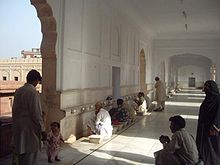Wudoo '
Wudu ' ( Arabic وضوء, DMG Wuḍūʾ ; Persian آبدست āb-dast , composed of āb 'water' and dast 'hand'; Turkish abdest ) is the small ritual ablution in Islam to achieve ritual purity ( tahāra ) .
Like many components of Islamic ritual law, the Wuḍūʾ is also subject to various controversies regarding the associated mandatory ( farḍ ) and voluntary ( sunna or mandūb ) components on the one hand and the circumstances that render it invalid on the other ( nawaqid ) . This follows from the different valuation of Prophetenaussprüche and the Koran text, the arguments based on the rules of the Arabic language happen.
procedure
The own state of ritual purity (Arabic: طهارة, ṭahāra), which is achieved through the Wuḍūʾ, is a prerequisite for the validity of the prayer . This is derived from the Hadith of Muhammad as well as from the Koran:
“You believers! When you stand up for prayer, wash your face and hands up to the elbows (beforehand) and stroke your head and (wash) your feet up to your ankles! [...] "
The core of the ritual-law-based purification process, which is recognized by all four Islamic schools of law , is based on this verse . Depending on the law school, further compulsory components may be added.
After a valid Wuḍūʾ one remains in this state of ritual purity until this state is abolished, for example through bowel movements, urination, loss of intestinal gases, sleep, etc. This means that a renewed ritual cleansing in the form of Wuḍūʾ is not necessarily necessary before each next prayer, as long as one is still in a state of ritual purity.
The Shāfiʿit al-Ghazālī names six indispensable components of a small ritual ablution:
- The expression of intention
- washing the face
- washing hands (up to the elbows)
- stroking the head
- washing the feet and
- adhering to this order.
Under certain circumstances it is permissible to stroke headgear such as turbans and leather socks with wet hands ( Masah /مسح / 'Masa') In addition, he names 18 recommended elements, such as rinsing the mouth, wiping over the ears, etc. The use of a Siwak is usually treated separately as recommended, as Mohammed is supposed to have said: “A prayer with Siwak is better than 70 prayers without siwak. "
The need for wuḍūʾ before touching the copy of the Koran (see 56:77 ff) and circling the Kaaba during the pilgrimage is generally affirmed by legal scholars.
Beyond the compulsory aspect of the Wuḍūʾ, there are manifold statements about circumstances for which it is recommended.
The prior declaration of the intention is compulsory in all schools of law, except the Hanafi . This is traced back to the prophet's saying "The deeds are according to the intentions".
Causes of Uncleanliness ( Najasah )

There are certain events that cancel the wuḍūʾ. This usually includes
- anything that emerges from the two excretory orifices (i.e. urethra and anus )
- sleep
- Loss of mind
- Bleeding (the leakage of blood from any part of the body)
The Shāfiʿites reject the invalidation of the wuḍūʾ by bleeding and add:
- Touching someone of the opposite sex
- Touching a person's genitals or anus
The Hanbalites add:
- apostasy
- Eating camel meat
- Condition when touching a person of the opposite sex: this is done with a desiring intention
The Hanafis reject the invalidation of the Wuḍūʾ by any touch, but add voiced laughter in prayer to the hadath .
With the Malikites , short, light sleep does not invalidate the Wuḍūʾ. When a person of the opposite sex is touched, they assume a similar position as the Hanbalites: a pleasurable thought at the touch, or the intention to do so, lead to invalidity, as does touching the penis.
place
While many mosques and medersas with an attached prayer hall in the Islamic world have fountain basins or fountain bowls, the tradition of the elaborately designed Şadirvan fountain has developed in Ottoman architecture . In arid areas (e.g. in southern Morocco) there was also the possibility of ritual cleansing before prayer with the help of a smoothly polished stone or dry earth or sand ( tayammum ).
See also
- Ghusl (great ablution)
literature
- E. Chaumont: Art. "Wuḍū.ʾ" In: The Encyclopaedia of Islam. New Edition. Brill, suffering. Vol. 11, pp. 218f.

